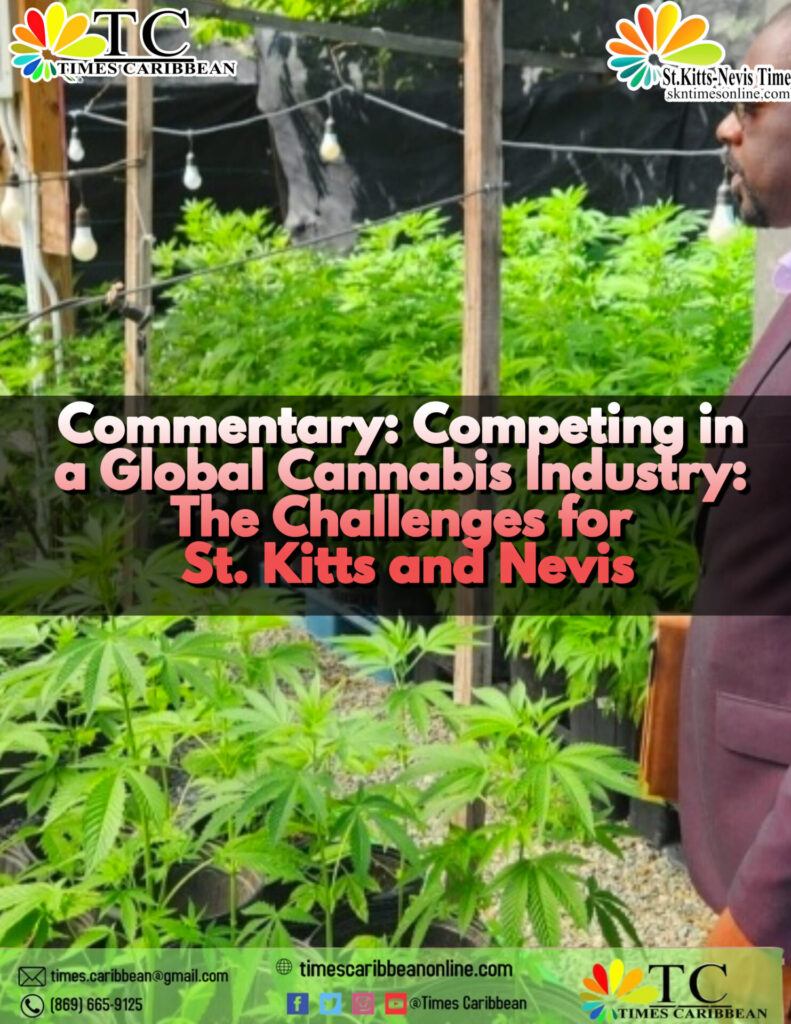As the global cannabis industry continues to flourish, with thousands of acres of cannabis cultivated across continents—from the expansive lands of Canada and Asia to the lush fields of Guyana, Jamaica, and even St. Vincent and the Grenadines—the question arises: how can St. Kitts and Nevis, the smallest independent nation in the world, hope to compete in either the medicinal or recreational cannabis markets?
The reality is sobering. Over the last two years, St. Kitts and Nevis has experienced a period of stagnation in the cannabis sector, marked by poor management and ineffective leadership. This stagnation has come at a time when the global industry has made tremendous strides, leapfrogging ahead in technological advancements, regulatory frameworks, and market penetration. While other nations have actively developed their cannabis industries—creating jobs, generating tax revenue, and establishing themselves as leaders in the global marketplace—St. Kitts and Nevis has largely stood still.
The recent appointment of Attorney Jihan Williams-Knight as the new chair of the cannabis industry has brought some hope for change. However, the industry remains plagued by the consequences of two years of retarded development. The lack of progress has not only hindered the nation’s ability to capitalize on the booming global cannabis market but has also resulted in a lost opportunity to establish a robust framework for both medicinal and recreational use.
The global cannabis market is rapidly evolving, driven by an increasing acceptance of cannabis use and its therapeutic benefits. Countries with extensive land and resources are harnessing the potential of cannabis cultivation to their advantage. In Canada, for example, the legalization of cannabis has led to a thriving economy, with millions generated in tax revenue. Similarly, countries in Asia are exploring their agricultural potential, positioning themselves as key players in the industry.
Meanwhile, the Caribbean region has seen countries like Jamaica and Guyana actively engage in cannabis cultivation, capitalizing on their unique climates and established cultural connections to the plant. St. Kitts and Nevis, with its limited land resources and a history of slow regulatory processes, faces significant hurdles. The disparity in development and readiness between St. Kitts and Nevis and its regional counterparts raises pressing questions about the nation’s ability to compete.
The clock is ticking for St. Kitts and Nevis to establish itself in the global cannabis landscape. With the world watching, it is imperative that the new leadership, spearheaded by Attorney Williams-Knight, initiates swift and effective reforms to revitalize the industry. This includes creating a comprehensive regulatory framework, encouraging investment, and fostering partnerships that can propel the nation into the global market.
Additionally, there must be a focus on education and community engagement to build public support for the industry. The benefits of cannabis—medicinal and economic—should be communicated clearly to the citizens of St. Kitts and Nevis, who may still harbor reservations about the plant.
As it stands, the global cannabis industry is not waiting for St. Kitts and Nevis to catch up. Countries with vast agricultural land are seizing the opportunity to become leaders in this burgeoning market. If St. Kitts and Nevis hopes to carve out a niche for itself, it must act decisively and swiftly. The opportunity is there, but only time will tell if this small nation can rise to the challenge and compete on the world stage. The future of the cannabis industry in St. Kitts and Nevis hinges on transformative leadership, innovative practices, and a willingness to embrace change before it is too late.

Source link : http://www.bing.com/news/apiclick.aspx?ref=FexRss&aid=&tid=66fb3156a447476980466500135cb59b&url=https%3A%2F%2Ftimescaribbeanonline.com%2Fcommentary-competing-in-a-global-cannabis-industry-the-challenges-for-st-kitts-and-nevis%2F&c=11013077329899021710&mkt=en-us
Author :
Publish date : 2024-09-30 11:15:00
Copyright for syndicated content belongs to the linked Source.












